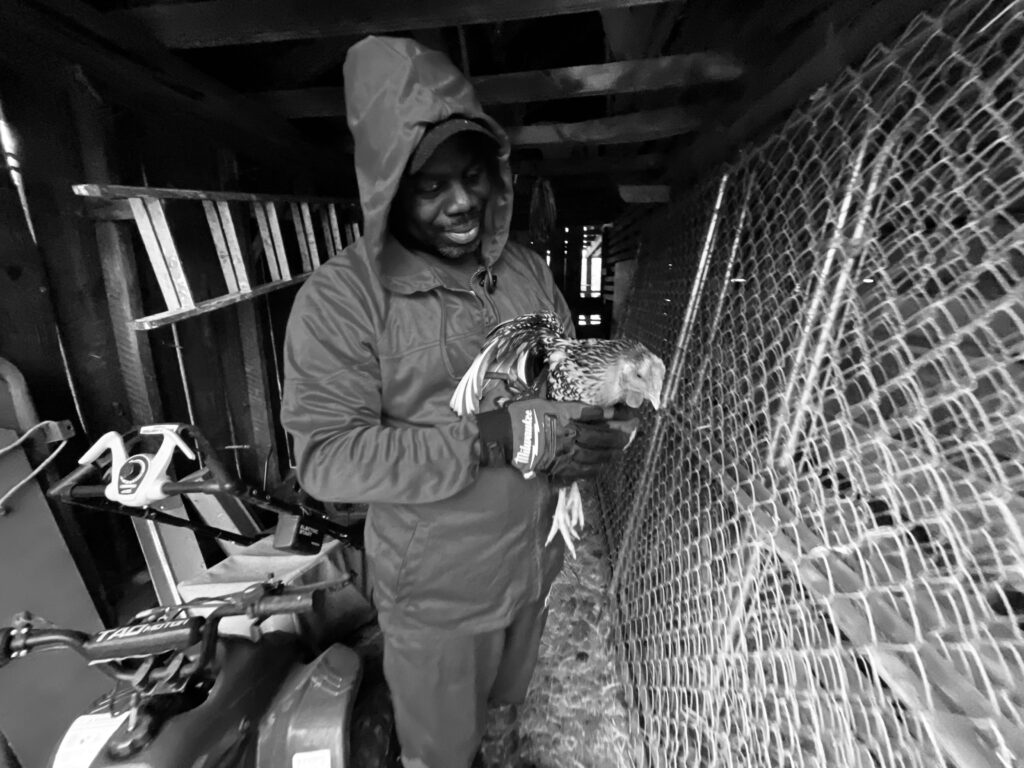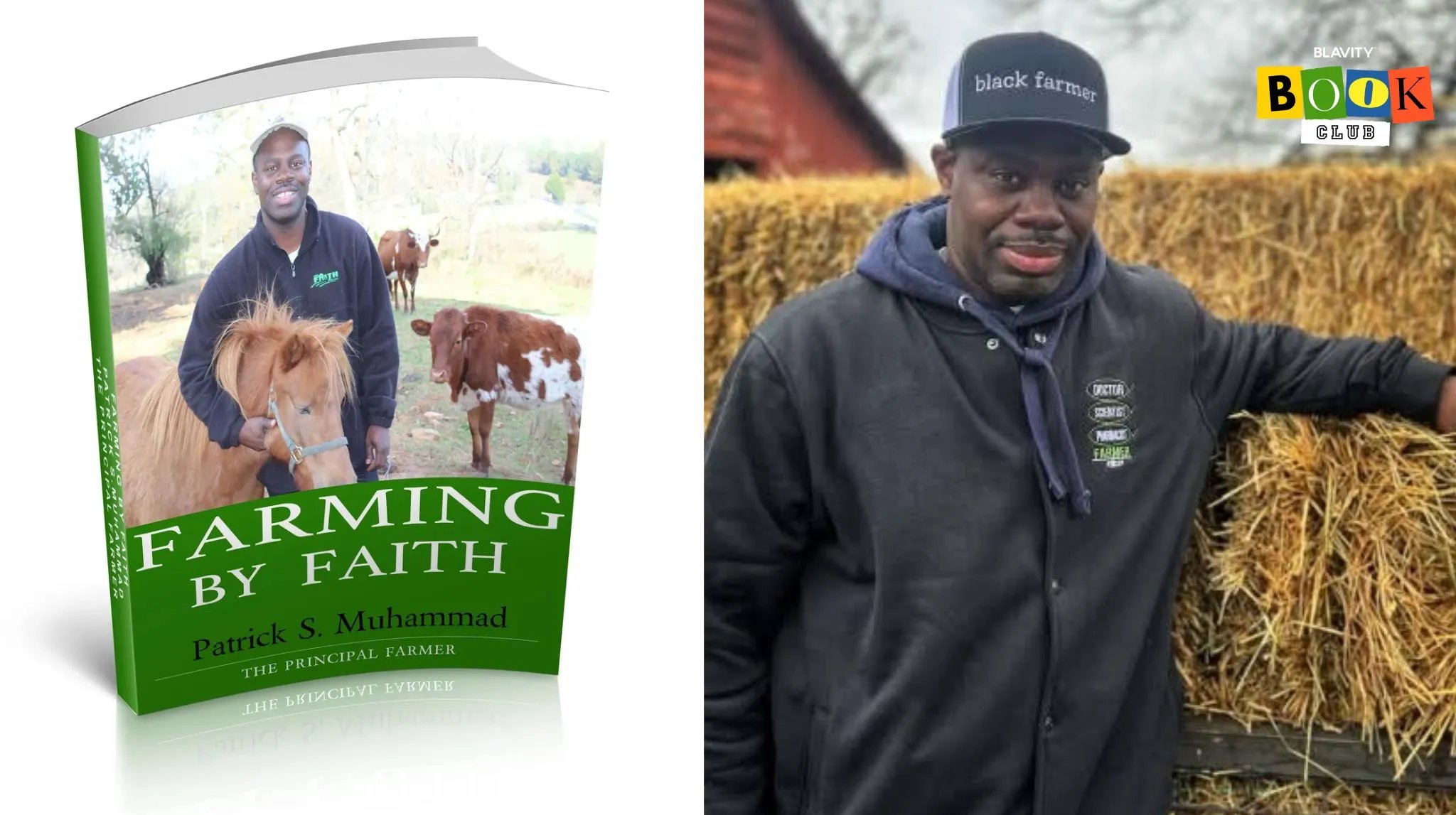Patrick Muhammad, known as “The Principal Farmer,” is a rising educator and farmer who has gained recognition for his expertise and contributions within the agriculture industry.
The Atlanta-based entrepreneur has built a name for himself by trusting his inner voice and taking a leap of faith in uncharted territory 10 years ago. Having once sought a more sustainable lifestyle, Muhammad left suburban life to establish a homesteading lifestyle that provided resources to his family and others. Since then, he’s been featured on the competition TV show Home Free, appeared in a John Deere commercial and made a cameo in Chicken Soup for the Soul: Being Dad.
In a recent interview with Blavity, Muhammad discussed his journey to success and his efforts to teach agricultural skills to the next generation, as well as those interested in homesteading.
What sparked Patrick Muhammad’s passion for farming?
Muhammad grew up in East St. Louis, which didn’t have farms since it was an urban area. What sparked his farming interests was his upbringing with some of his relatives. Spending time shucking peas with his grandmother at his grandfather’s home, which had a leased plot of land, and visiting his uncle, who lived in Arkansas and owned a horse, had a significant impact on him. When he attended college in Kentucky, his new environment further enlightened him.
Following his higher education journey, Muhammad began a career in education. He became a principal and consistently helped champion the next generation in that role. One day, though, he had a conversation with his father, who posed a question to him about legacy and wealth.
“He was like, ‘Son, I’m so proud of you. You’re a principal, your family’s doing okay, but do you think you can leave your children a principal parking space?’ And I was like, ‘No, dad. You know, once I’m out, they’ll have a new principal,'” Muhammad told Blavity. “So he said, ‘You have to begin to see what you can do to pass on to your children and ultimately your grandchildren.’ And so he put me on an assignment to begin to study white wealth. And what are wealthy white families leaving? They all have a farm in their portfolio.”
This moment served as the ultimate catalyst that propelled Muhammad into a deep dive into learning about farming. He eventually set his sights on purchasing a large piece of land.
“As you begin to look at what you can pass down that’s tangible, that makes it through inflation, that makes it through recessions,” he said.

The result? Your Faith Farms, a 31-acre family-owned farm in South Fulton, GA. Although Muhammad was nervously anxious about the “risk” of taking his entire life savings and “moving from a 30-foot yard subdivision to 31 acres with no experience,” he was able to turn a dream into a successful farming infrastructure. The pandemic and the inflations that followed soon after was a period where his family’s love for their lifestyle grew because nature became their “biggest teacher.”
“That was a great time space for us to get closer as a family, appreciate our farm, and enjoy the bounties that come from working the land and those experiences,” he said. “Additionally, during this last egg spike, my eggs were the same price. My hens laid the same egg every day … [And] if we’re now preparing that and learning how to can, [we’ll be able to sustain during hard times]. So, what I grow in the fall, we don’t eat it all. The wife takes some in, and she can sit right in the middle of January, we’re eating fresh tomatoes that we grew, you know, in late October.”
He added, “She’s taking the pears and making the jams and the jellies. And so now, with intentionality and looking forward, we can create the sustainable practices that our great-grandparents really did.”
How Patrick Muhammad turned faith into an agricultural movement
Over the last decade, the company has experienced significant growth. Muhammad explained how his belief, coupled with his wife’s support, helped him develop a confident approach to founding the homestead.
“We know it has to be God’s favor on our decision because the life that we live now, you can’t pinpoint it to training and experience, right? So, to go from that to over 40 cows, 60 sheep, 20-something horses in my house, 100-something chickens … 30, 40 fruit trees, and we’re doing eggs every day,” he said. “So, this life that we’re living and the lives that we’re touching and the impact that we’re having, it can’t be anything but from faith because you can’t point it to anything else.”
With Muhammad’s educational background, he wasn’t in the business of gatekeeping all the vital information he absorbed throughout his journey. His family has helped over 40 households acquire land and start their homestead for sustainable living. He didn’t completely abandon guiding children in their pursuit of education, either. He founded Chattahoochee Hills Charter School, which incorporates a hands-on approach to learning about agriculture, a practice that he noticed helps his students become more compassionate about life.
“Our school is a school farm where we’re teaching 540 children about agriculture every day,” he said.
Something that Muhammad believes has been lost is the tradition of families buying groceries, cooking and eating together at the dinner table.
“There’s no conversation. So, the slow food movement does more than just make us sit down. It’s helping us connect as a family. It’s helping us maybe understand what grandma means when she said, ‘A pinch of this, a dab of that,'” he shared. “We’re going to eat healthier because we’re going to make sure we’re cooking it to our liking, not just because it’s 12 people honking in the driveway and they’re rushing.”
Muhammad is set to release his latest book
In a candid reflection on civic engagement, Muhammad emphasized the need to encourage communities to pay closer attention to the policies being shaped in their neighborhoods.
“We have to understand that the most powerful politics and policies are local,” he said. “What the current president does and says is [that] he sends it over to the policymakers, etc., and it has to go into a law. By the time it gets to us, the four-year term is up, [and] we’re back in reelections, right? And so we get caught up in that. And I’m not saying it’s a total distraction, but while they’re doing that, something is happening in my community today.”
“I believe we need to start first as a local community. Then we influence our state officials, and then our state officials then influence the larger body,” Muhammad added.
He is set to release his third book, Farming by Faith, later this year through his publishing company, RATHSI Publishing. The primary chapter he wants people to focus on is “Don’t Give Up” because his farming practices were full of learning curves that helped build him and his company into what they are today.
“We have to find the right key to open the door just to see what’s on the other side,” he said. “And so my faith really kicked in, and I had to really ask God to guide me and show me through this uncertain time. And those dark days are so far behind that I don’t want to seem … I’m not arrogant. I don’t want to seem like that, but now everything I touch turns to go right.”
He continued, “We failed forward, got back up. Okay, that one didn’t work. Try it again. But we kept making progress to where now what the future holds, I know our cup is running over enough.”
His book Farming by Faith is available now for preorder on his website.
